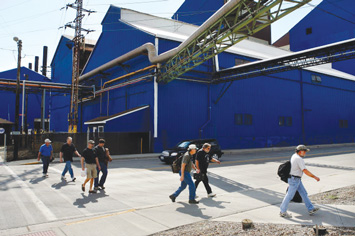Union resistance stalls sale of blast furnaces at the Granite City Works
 1,000 jobs on the line
1,000 jobs on the line
By ELIZABETH DONALD
Illinois Correspondent
More than a year after U.S. Steel announced its intent to sell its two blast furnaces at the Granite City plant to SunCoke Energy, the deal still hasn’t gone through, largely due to union resistance.
SunCoke and U.S. Steel announced their intent in June 2022, which would allow SunCoke to manufacture pig iron in Granite City – and cost approximately 1,000 jobs at the plant. The language in the contract with United Steelworkers Local 1899 gives Labor “a voice and a seat at the table,” according to Local 1899 President Dan Simmons, but as of six months ago, the sale was a live issue and “not a done deal.”
The Steelworkers’ national contract, ratified in December, covers 11,000 members of 13 locals at U.S. Steel plants.
U.S. Steel held a conference call on second-quarter earnings at the end of July and analysts asked about the SunCoke deal, according to the St. Louis Business Journal.
“I’m not sure we’ve got a whole lot to update you on,” replied U.S. Steel President and CEO David Burritt.
Simmons said at the moment, discussions are in “limbo stage.” There have been no meetings or bargaining sessions since last summer, and he said the Labor position on the issue has not changed.
“They have not satisfied our requests or given an explanation why they want to hand (the furnaces) over to a third party,” Simmons said. “There’s not been any update on it… they keep claiming phases and engineers to move forward, but they haven’t reached any kind of agreement with us.”
CONGRESSIONAL GRILLING
In June, U.S. Steel Senior Vice President Richard Fruehauf faced grilling by U.S. Rep. Nikki Budzinski, who questioned him about the Granite City plan during the Congressional Steel Caucus’ annual meeting.
“Why? Why leave?” she asked. “Why would U.S. Steel choose to abandon high-skilled Labor? Why would U.S. Steel be uninterested in pursuing the litany of tax credits?”
She pointed out that U.S. Steel has operated in Granite City since 1978, with generations of Granite City families supported through its operation.
Budzinski added that SJ18 – a lightweight hard steel used in automotive production – is only made in Granite City in the U.S., and other mills have not been able to replicate its production.
“There are capabilities of high-grade production at Granite City no other integrated facility can match in the United States,” Budzinski said. “So how could the answer be to get rid of these blast furnaces in Granite City?”
Simmons confirmed that SJ18 has only been successfully produced in Granite City and one facility in Japan. “It’s quite a niche that no one else can make it,” he said. “Others have tried and failed miserably.”
PLANNING MOVE TO LOW-WAGE RTW STATES
Budzinski had her own answer: she said she believes U.S. Steel is planning to move operations to so-called “right-to-work” states for cheaper Labor with fewer protections, to improve their profit margins.
“And I have to say quite frankly, Granite City is not alone in this trend,” Budzinski said. “We shouldn’t stand for this.”
Simmons agreed. “That’s exactly what they’re doing,” he said, pointing out that U.S. Steel’s new facility was relocated to Arkansas as a non-union facility in a so-called “right-to-work” state.
Meanwhile, U.S. Steel reported adjusted net earnings of $483 million in the second quarter of 2023. Burritt told investors that U.S. Steel is essential to the communities where it operates. “Notably we are supplying customers with cutting-edge steels that are mined, melted and made in the USA,” he said. “We remain bullish for U.S. Steel.”
Simmons said that success comes from the union workers. “We are making them some good money right now, and they want that,” he said.



Leave a Reply